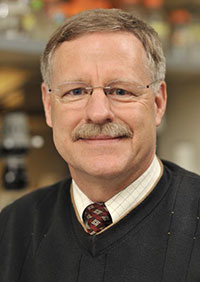2013 Alumni Fellow
Dr. Terry McElwain, DVM 1980

Dr. Terry McElwain, Pullman, Wash., has been selected as the 2013 Alumni Fellow for the Kansas State University College of Veterinary Medicine. Dr. McElwain will be on campus Feb. 20 and 21 for a variety of activities, tours and seminars. On Feb. 21, he will present a seminar to the college. In the evening, there will be a reception for the Alumni Fellows at the Alumni Center at 6:30 p.m. During the banquet, the K-State Alumni Fellows program, sponsored by the Dean’s Council, the President’s Office and the Alumni Association will present the Alumni Fellows awards to Dr. McElwain and the recipients from the other eight academic colleges, graduate school and division of continuing education.
Dr. McElwain received a bachelor’s degree in 1978 and a D.V.M. degree in 1980, both from Kansas State University. He completed a residency and NIH postodoctoral fellowship in Pathology from 1981 to 1986, and then a Ph.D. in infectious diseases and immunology in 1986, all at Washington State University. He was named a diplomate of the American College of Veterinary Pathologists in 1985. Since 1993, Dr. McElwain has been director and executive director of the Washington Animal Disease Diagnostic Laboratory, a state, regional and national diagnostic facility for animal and zoonotic diseases and core reference laboratory in the National Animal Health Laboratory Network (NAHLN) and Laboratory Response Network for Bioterrorism (LRN) at Washington State University. Dr. McElwain holds an academic appointment as professor and serves as associate director of the Paul G. Allen School for Global Animal Health.
“I am honored to be selected as the 2013 Alumni Fellow for the College of Veterinary Medicine,” Dr. McElwain said. “Over 30 years ago, I completed my DVM degree – the second of two degrees from Kansas State University. To be recognized by the institution that provided the foundation for a career that has rewarded me many times over is humbling. My heartfelt thanks are extended to the KSU community for this honor.”
“Dr. McElwain’s passion for science and research has put him at the top of his profession,” said Dr. Ralph C. Richardson, dean of the K-State College of Veterinary Medicine. “His work on preventing infectious diseases and protecting the nation’s food supply is having a global impact on both animal and human health. As a highly respected leader, he is a tremendous representative for the College of Veterinary Medicine and Kansas State University.”
In 2009, Dr. McElwain was elected to the National Academy of Sciences, Institute of Medicine and to the Washington State Academy of Sciences. He is a Fellow in the American Association for the Advancement of Science, and he has served as an external advisor to Centers for Disease Control for development of the Global Microbial Threats Strategy, as an external adviser to the United Nations International Atomic Energy Agency on diagnostic assay standardization and test validation, and has represented the American Association of Veterinary Laboratory Diagnosticians at the World Organization for Animal Health. Dr. McElwain was selected as a committee member for the National Academy of Sciences study “Assessing the Nation’s Framework for Addressing Animal Diseases” and the Institute of Medicine study on “Achieving Sustainable Global Capacity for Surveillance and Response to Emerging Diseases of Zoonotic Origin.” Recently he was selected by the National Academy of Sciences National Research Council to Chair a critical fast track study assessing the need for and scope of a proposed National Bio- and Agro-Defense Laboratory.
Dr. McElwain is a past president of the American Association of Veterinary Laboratory Diagnosticians, and is a member of the Board of Directors of the World Association of Veterinary Laboratory Diagnosticians. His vision and leadership were instrumental in creating and establishing the National Animal Health Laboratory Network, a nationwide network of laboratories that has served as a model for coordinated laboratory-based surveillance globally. Dr. McElwain received the 2006 USDA Administrator’s Award in recognition of his leadership in development of the NAHLN, the first time the award was given to an individual from academia. He has provided leadership in development and deployment of diagnostic assays such as the tests used for detection of the pandemic H1N1 and the newly emerging H3N2 influenza viruses in swine, and development of national policies associated with their use and reporting.
Dr. McElwain and his wife, Karen, have three children: Camille, Mark and Katherine.